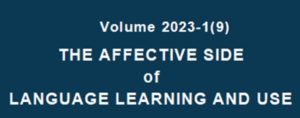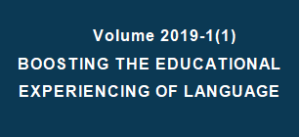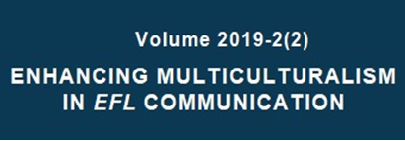* Forthcoming issues
* Previous issues
* Special calls
* Thematic range
2024
Volume 2024-1(11):
LINKS BETWEEN BELIEFS AND LANGUAGE
(deadline for paper submission: 30 June 2024)
2023
THE LATEST
Volume 2023-2(10):
THE EMOTIONAL DIMENSION OF LANGUAGE AND OF LINGUISTIC EDUCATION
THE EMOTIONAL DIMENSION OF LINGUSITIC EDUCATION
THE EMOTIONAL DIMENSION OF LANGUAGE
Volume 2023-1(9):
THE AFFECTIVE SIDE OF LANGUAGE LEARNING AND USE
PRIORITIZING AFFECT
BUILDING UPON AFFECT
PREVIOUS ISSUES
2022
Special Issue 1
LSP EDUCATION SERVING CROSS-CULTURAL COMMUNICATION
SCIENCE IN LSP CONTEXTS
TRANSLANGUAGING IN LSP CONTEXTS
LANGUAGE SKILLS IN LSP CONTEXTS
Volume 2022-2(8):
LINGUISTIC CONTEXTS AND DIVERSITY IN EDUCATION
DIVERSE LINGUISTIC CONTEXTS
DIVERSE LINGUISTIC MEANS
Volume 2022-1(7):
PLACING LANGUAGE IN THE CENTRE OF SCHOOLING
CENTRALISING SPOKEN AND WRITTEN TEXT
CENTRALISING LANGUAGE-ORIENTED METHODS AND POLICIES
2021
2021
|
Volume 2021-1(5): COVID-19 – A SOURCE OF THREATS OR OPPORTUNITIES FOR LINGUISTIC EDUCATION? LOSES AND GAINS ON THE PEDAGOGICAL STRATUM CHALLENGES AND PERSPECTIVES ON THE LINGUISTIC STRATUM |
Volume 2021-2(6): LINGUISTIC WELL-BEING (before, during, and after the pandemic) RECOGNISING THE LINGUISTIC WELL-BEING OF STUDENTS APPRECIATING THE LINGUISTIC WELL-BEING OF EDUCATORS |
2020
|
Volume 2020-1(3): EXAMINING LEARNER AND TEACHER LANGUAGE IDENTITY Identity on the level of critical awareness Identity on the level of official documents Identity on the level of educational texts Identity on the level of didactic practices |
Volume 2020-2(4): (RE-)SHAPING ONE’S IDENTITY WITH LANGUAGE Interdisciplinary perspectives Cross-cultural encounters Pursuits of linguistic quality Assimilative intersections |
2019
|
LAUNCH ISSUE–Volume 2019-1(1): BOOSTING THE EDUCATIONAL EXPERIENCING OF LANGUAGE Experiencing language content Experiencing digital interaction Experiencing the spoken language Experiencing the written word |
Volume 2019-2(2): ENHANCING MULTICULTURALISM IN EFL COMMUNICATION Multiculturalism in didactic practices Multiculturalism in educational documents Multicultural beliefs Multicultural experience |
LATEST CALL: ON THE BORDERLINE BETWEEN L2/FL SPEAKING AND ITS SISTER SKILLS AND SUBSYSTEMS
Strands-oriented calls
Other calls
I. Educational Role of Language at the level of SOCIAL AND CULTURAL DETERMINANTS
We seek papers addressing questions such as the following: (1a) What function of language is assigned by educational systems of different countries? (1b) What approach to language do teachers of different nationalities represent?, (2a) How is children’s language activity valued and assessed in educational systems of different countries?, (2b) What hinders the development of pupils’ language competence in different societies and cultures?, (3a) How do children of particular nationalities experience their contact with and use of language?, (3b) What differences can be observed in pupils’ approach to their native and foreign languages?, (4a) To what extent does children’s language use reflect national (stereotypical) characteristics?, (4b) What image of the world is reflected by textbooks used by pupils in particular countries?, etc.
II. Educational Role of Language at the level of LANGUAGE SKILLS, especially SPEAKING
We also seek papers addressing problems such as: What objectives are assigned to four language skills?, What sources do teachers implement for practising L1 and L2 skills?, What means are recommended in official documents to maximise pupils’ language production?, How much sense of freedom do schools advocate with regard to pupils’ choice of books and other texts?, What type of texts do pupils read/write most frequently/willingly?, By what means is creative writing encouraged?, What types of speaking skills are most representative in different cultures?, Which genres prove most conducive to pupils’ motivation to read (and thus to general education)?, Which elements of pupils’ native language prove most fossilised in their written texts?, What general abilities does effective writing require and foster?, etc.
III. ‘HOW DO WE UNDERSTAND THE EDUCATIONAL ROLE OF LANGUAGE?‘, answered from different perspectives from around the world.
This overall question has been broken into the following four problems relating to language vs. beliefs, activity, affect and thinking, which we encourage authors to present their position on: (1). What theories and studies shape your understanding of the educational role of language? (2). What concepts and findings drive and support your students’ language-based practices? (3).Which educational events and methods affect the way students feel about their language(s)? (4). What language images and representations are recommendable for educational purposes?These questions are only exemplary and papers addressing the said general question can propose its different interpretations.
Note that ERL Journal has come into existence upon a number of classifications to be reflected by the structure of each of its volumes:
1. issues to be raised: educational issues through the prism of (applied) linguistics & linguistic issues examined from the pedagogical perspective,
2, problems to be posed: factual (i.e. on facts, situations, circumstances), reflective (i.e. on personal beliefs, preferences, convictions), phenomenal (i.e. on phenomena, processes, regularities, etc.), argumentative (general arguments, ideas, values), etc,.
3. disciplines to be capitulated on: inter alia, psycholinguistics, sociolinguistics, language anthropology, methodology of teaching foreign languages, etc.
4. specialists to be consulted: applied linguists, educational anthropologists, L1 and L2 teachers, cognitive science, discourse analysts, etc.
| ALL TITLES PUBLISHED IN ERL JOURNAL (alphabetically) | |









